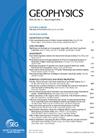从地震响应模拟到CNN检测的古岩溶洞穴识别
IF 3.2
2区 地球科学
Q1 GEOCHEMISTRY & GEOPHYSICS
引用次数: 0
摘要
在世界各地的碳酸盐岩地层中发现的古岩溶系统,具有创造巨大储集层和促进油气运移的潜力。因此,研究这些体系对碳酸盐岩储层的勘探和开发具有重要意义。我们提出的方法是使用基于卷积神经网络(CNN)的方法来自动精确地识别三维地震数据中的洞穴特征。我们提出了一种有效的方法来产生大量的三维训练数据,该数据由合成地震数据和地震数据中包含的洞穴特征标记组成,作为绕过训练CNN的标记任务的解决方案。该工作流使用点扩展函数(psf)来模拟地震数据中的洞穴响应,并允许我们轻松生成具有不同地质结构和洞穴特征的逼真和多样化的合成训练数据集。利用这些合成数据集训练CNN,可以有效地学习探测野外地震体中的洞穴特征。我们用多个例子评估了我们的方法的有效性,发现它比以前的方法(包括地震属性和其他基于cnn的古岩溶表征方法)执行得更准确。本文章由计算机程序翻译,如有差异,请以英文原文为准。
Paleokarst caves recognition from seismic response simulation to CNN detection
Paleokarst systems, found in carbonate rock formations worldwide, have potential for creating vast reservoirs and facilitating hydrocarbon migration. Thus, studying these systems is essential for the exploration and development of carbonate reservoirs. Our proposed approach is to use a convolutional neural network (CNN) based method to automatically and precisely identify cave features within 3D seismic data. We present an efficient method to produce ample amounts of 3D training data, which is comprised of synthetic seismic data and labels for cave features contained in the seismic data, as a solution to bypass the labeling task for training the CNN. This workflow uses point-spread functions (PSFs) to simulate cave response in the seismic data and allows us to easily generate realistic and diverse synthetic training datasets with different geological structures and cave features. By training the CNN with these synthetic datasets, it can effectively learn to detect cave features in field seismic volumes. We have evaluated the effectiveness of our method using multiple examples and found that it performs more accurately than previous methods, including seismic attributes and other CNN-based paleokarst characterization methods.
求助全文
通过发布文献求助,成功后即可免费获取论文全文。
去求助
来源期刊

Geophysics
地学-地球化学与地球物理
CiteScore
6.90
自引率
18.20%
发文量
354
审稿时长
3 months
期刊介绍:
Geophysics, published by the Society of Exploration Geophysicists since 1936, is an archival journal encompassing all aspects of research, exploration, and education in applied geophysics.
Geophysics articles, generally more than 275 per year in six issues, cover the entire spectrum of geophysical methods, including seismology, potential fields, electromagnetics, and borehole measurements. Geophysics, a bimonthly, provides theoretical and mathematical tools needed to reproduce depicted work, encouraging further development and research.
Geophysics papers, drawn from industry and academia, undergo a rigorous peer-review process to validate the described methods and conclusions and ensure the highest editorial and production quality. Geophysics editors strongly encourage the use of real data, including actual case histories, to highlight current technology and tutorials to stimulate ideas. Some issues feature a section of solicited papers on a particular subject of current interest. Recent special sections focused on seismic anisotropy, subsalt exploration and development, and microseismic monitoring.
The PDF format of each Geophysics paper is the official version of record.
 求助内容:
求助内容: 应助结果提醒方式:
应助结果提醒方式:


